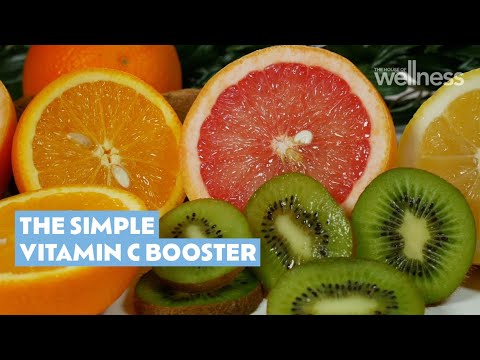Vitamin C
Vitamin C, also known as L-ascorbic acid, is a water-soluble vitamin that is naturally present in some foods, added to others, and available
as a dietary supplement. Humans, unlike most animals, are unable to synthesize vitamin C endogenously, so it is an essential dietary
componentVitamin C is required for the biosynthesis of collagen, L-carnitine, and certain neurotransmitters; vitamin C is also involved
in protein metabolism . Collagen is an essential component of connective tissue, which plays a vital role in wound healing. Vitamin C is
also an important physiological antioxidant and has been shown to regenerate other antioxidants within the body, including alpha-tocopherol
(vitamin E) . Ongoing research is examining whether vitamin C, by limiting the damaging effects of free radicals through its antioxidant
activity, might help prevent or delay the development of certain cancers, cardiovascular disease, and other diseases in which oxidative stress
plays a causal role. In addition to its biosynthetic and antioxidant functions, vitamin C plays an important role in immune function and
improves the absorption of nonheme iron , the form of iron present in plant-based foods. Insufficient vitamin C intake causes scurvy, which
is characterized by fatigue or lassitude, widespread connective tissue weakness, and capillary fragility
Vitamins are substances that your body needs to grow and develop normally. Vitamin C is an antioxidant. It is important for your skin, bones,
and connective tissue. It promotes healing and helps the body absorb iron.
Vitamins are substances that your body needs to grow and develop normally. There are 13 vitamins your body needs. They are
Vitamin A
B vitamins (thiamine, riboflavin, niacin, pantothenic acid, biotin, vitamin B-6, vitamin B-12 and folate)
Vitamin C
Vitamin D
Vitamin E
Vitamin K
You can usually get all your vitamins from the foods you eat. Your body can also make vitamins D and K. People who eat a vegetarian diet may need to take a vitamin B12 supplement.
Each vitamin has specific jobs. If you have low levels of certain vitamins, you may get health problems. For example, if you don’t get enough vitamin C, you could become anemic. Some vitamins may help prevent medical problems. Vitamin A prevents night blindness.
The best way to get enough vitamins is to eat a balanced diet with a variety of foods. In some cases, you may need to take vitamin supplements. It’s a good idea to ask your health care provider first. High doses of some vitamins can cause problems.
Vitamin C comes from fruits and vegetables. Good sources include citrus, red and green peppers, tomatoes, broccoli, and greens. Some juices
and cereals have added vitamin C.
Some people may need extra vitamin C:
Pregnant/breastfeeding women
Smokers
People recovering from surgery
Burn victims
Function
Vitamin A helps form and maintain healthy teeth, bones, soft tissue, mucous membranes, and skin.
Vitamin C, also called ascorbic acid, is an antioxidant that promotes healthy teeth and gums. It helps the body absorb iron and maintain
healthy tissue. It is also essential for wound healing.
Vitamin D is also known as the “sunshine vitamin,” since it is made by the body after being in the sun. Ten to 15 minutes of sunshine 3 times
a week is enough to produce the body’s requirement of vitamin D for most people at most latitudes. People who do not live in sunny places may
not make enough vitamin D. It is very hard to get enough vitamin D from food sources alone. Vitamin D helps the body absorb calcium. You need
calcium for the normal development and maintenance of healthy teeth and bones. It also helps maintain proper blood levels of calcium and
phosphorus.
Vitamin E is an antioxidant also known as tocopherol. It helps the body form red blood cells and use vitamin K.
Vitamin A
One type comes from animal sources of food. It helps you see at night, make red blood cells, and fight off infections. The other type is in plant foods. It helps prevent damage to cells and an eye problem called age
How Much Vitamin C Is Enough?
Most of the studies Moyad and his colleagues examined used 500 daily milligrams of vitamin C to achieve health results. That’s much higher
than the RDA of 75-90 milligrams a day for adults. So unless you can eat plenty of fruits and vegetables, you may need to take a dietary
supplement of vitamin C to gain all the benefits, Moyad says. He suggests taking 500 milligrams a day, in addition to eating five servings
of fruits and vegetables.
“It is just not practical for most people to consume the required servings of fruits and vegetables needed on a consistent basis, whereas
taking a once-daily supplement is safe, effective, and easy to do,” Moyad says. He also notes that only 10% to 20% of adults get the
recommended nine servings of fruits and vegetables daily.
#immunity
#vitamins
#vitamin c
If you found this video useful, be sure to like , Share & Subscribe our channel.






